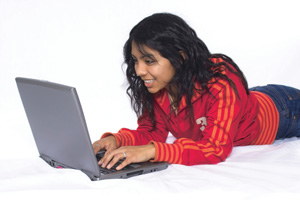 Jeff* feels like he barely sees his 14-year-old daughter anymore — even when she’s at home. “She’s always on the computer, saying she’s got work to do,” he says, “but I know her school isn’t assigning four to five hours of homework every night.” He suspects Rosie is actually spending a significant amount of time chatting with friends online and watching TV shows on Hulu. Jeff and his wife want Rosie to be independent and manage her schoolwork herself, but “we feel like we’ve lost control, and our family time is disappearing,” he says.
Jeff* feels like he barely sees his 14-year-old daughter anymore — even when she’s at home. “She’s always on the computer, saying she’s got work to do,” he says, “but I know her school isn’t assigning four to five hours of homework every night.” He suspects Rosie is actually spending a significant amount of time chatting with friends online and watching TV shows on Hulu. Jeff and his wife want Rosie to be independent and manage her schoolwork herself, but “we feel like we’ve lost control, and our family time is disappearing,” he says.
As more and more homework migrates to the computer parents are looking for ways to integrate the computer into their children’s study habits. And while it is a necessary tool, the computer can also be a Pandora’s box of distractions.
“Tantalizing things are always popping up on tweens’ and teens’ computer screens from friends,” says Joanne Cantor, the author of Conquer CyberOverload: Get More Done, Boost Your Creativity, and Reduce Stress. Kids send messages to each other, share links to YouTube videos and post photos on their Facebook pages. When students open up their computer to work, it can look like there’s a party happening online, Cantor says. Even motivated kids can have problems, explains Cantor, because all of these distractions come at them constantly.
Finding focus
How to quiet the chaos and get a little focus? Cantor advises parents to teach teens to turn off all distractions — even the social-media kind — work for 30–60 minutes, and then take a short social break before starting the next chunk of homework. She believes students will discover that they can get more done, with higher-quality results in a shorter amount of time, if they truly focus. In turn, they’ll also have more free time.
Until students can manage their own computer usage efficiently, Cantor and other experts suggest parents try a number of ways to help tweens and teens focus:
• Establish an electronics curfew. Distractions can lengthen the time it takes to do homework, keeping students up too late at night. To help kids become more efficient, put the computer and phone away every night at 9 p.m. If they don’t finish their homework by the curfew, let your tween/teen face the natural consequences of a missed assignment or poor test score — they will likely become more efficient over time.
• Remove distractions. Tackle homework that doesn’t require the computer, such as reading, math sheets or vocabulary cards, first. Save computer work for last, so if students do get distracted, at least the rest of their work is already done. Turn off the house WiFi or modem when you want students to use the computer but not access the Internet (if neighbors have unsecured networks, this won’t work). Allow no text/chat/Skype/Facebook/Hulu during homework time. Be sure to put students’ cell phones away, too.
• Work in a public space. Tweens/teens should use the computer in the kitchen or dining room, where the screen is visible to passers-by, rather than in a bedroom. But you should know that kids are proficient at switching screens in a second when they see parents approaching, so it’s better if the screen is facing the parents’ direction.
• Parental controls. Some software products will help you set up a list of websites your child cannot access. Blocking Facebook, Hulu, YouTube and other time-wasters can help a teen to focus. Students can always use those sites on your computer when homework is done.
• Balance. Give your student breaks to chat with friends and socialize online.
• Rules are a work in progress. Be flexible if your rules aren’t working. It’s easier to start strict and later loosen the reins.
• Model the behavior you want to see. Don’t tell your teens/tweens they are spending too much time on the computer if you’re parked on the couch with your own laptop every night. Put your laptop away until they go to sleep.
Of course, the computer also brings benefits to students’ lives. Some find it helps them keep their assignments more organized and take better notes in class.
High school senior Guy Thyer says he is more focused on his work when he logs onto his computer these days, compared to when he first got it in middle school. “I used to spend hours and hours every day socializing online,” he says. As his workload increased through high school and other time commitments like sports became more intense, he found he needed to reduce his extracurricular online activities. “I started making a homework timeline every night to be sure I had time to get it all done,” he says, “but I do try to include 30 minutes to check sports scores, Facebook, things like that. ”
Ultimately, teens do need to be able to monitor their own computer use, says Cantor, because when they get to college, they’ll be solely responsible for managing their time. Parents should teach good habits to their tweens/teens and aim for their self-sufficiency. As with so many other aspects of teenagers’ lives, at some point, mom and dad do have to remove the parental controls.
Julie Weed is a best-selling author and Seattle-based freelancer who writes for The New York Times and other publications.
*Last name withheld to protect privacy.









